Kick-start your conservation career by interning
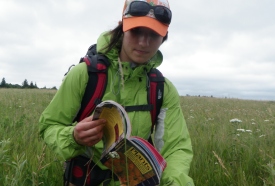
NCC conservation intern monitoring plant communities (Photo by NCC)
If you’re close to graduating from a post-secondary institution, you may have already started to think about applying for jobs related to your field of study. While school is an excellent place to expand your general knowledge, not all post-secondary programs provide students with adequate opportunities to put what they’ve learned into practice. Employers often expect applicants to have some hands-on experience under their belt to be considered for most entry-level positions.
So how do you get this experience to build your skill set? Consider interning at an environmental or conservation organization, such as the Nature Conservancy of Canada (NCC), during your summer break.
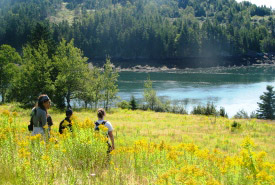
NCC summer interns and stewards of Pendleton Island, NB (Photo by NCC)
By doing a conservation internship, you’ll have an advantage over other applicants who may lack this kind of experience, and it will improve your chances of landing that dream entry-level job in the conservation sector. In fact, many former NCC interns have gone on to become full-time NCC staff, including Lisa McLaughlin, NCC’s vice-president of conservation policy and planning. Past NCC interns have also gone on to have successful careers in conservation at other organizations. For example, former NCC intern Donald Humphrey is now the regional manager of Fisheries and Oceans Canada’s Species at Risk program.
Here are some valuable assets and skills you can develop by interning in conservation:
Planning and organization
No matter what career path you choose to follow, the ability to plan ahead and be organized is highly valued by employers. This past summer, some Nature Conservancy of Canada (NCC) interns put these skills into action while planning Conservation Volunteers events.
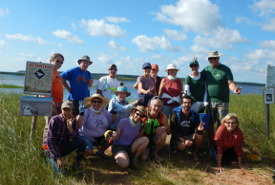
2017 Boughton Island beach cleanup (Photo by NCC)
“Over the summer, I organized three separate Conservation Volunteers events: Duck Day, Boughton Island Kayak Cleanup and Owl Build You a Nest Box,” says Leigh Gustafson, former Conservation Intern in Prince Edward Island. “The preparation and execution of these events taught me time management and public outreach skills, as well as how to think on my toes in moments when things don’t go according to plan.”
Working with your hands and using tools
While NCC expects its internship program applicants to be comfortable working with their hands and have familiarity with using tools, doing an internship can help you hone these transferable skills and learn how to use new tools.
“During my time with NCC, I learned how to wrap barbed wire fencing, remove fence posts by hand and clear a fence line,” says Christine Kuntzemann, former northern Alberta Conservation Intern.
Former interns have also gained experience using a wide range of tools, such as hammers, fencing pliers, loppers and secateurs.
Identifying species
Being able to identify species, especially invasive ones, is a crucial skill for many conservation sector positions, including field technician positions, environmental restoration jobs, range and riparian specialists and county weed inspectors. This aptitude is especially helpful for any role that involves identifying plants and managing land.
“I had never had formal training in flora or fauna identification, especially not with those found on PEI,” says Leigh. “I’m proud to say that I can now successfully identify all of PEI’s native tree species and a few shrubs and plants.”
Teamwork, communication and interpersonal skills
Virtually any job in the conservation sector requires working and interacting with others who come from diverse backgrounds and with their own viewpoints. Not only will you be interacting with fellow colleagues, but also with local landowners, partner organizations or community members.
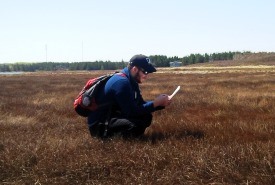
NCC Conservation Intern Mitchell MacMillan working in the field, PEI (Photo by NCC)
“Jocelyn Wood, NCC’s West Coast program stewardship coordinator, taught me how to represent NCC while interacting with landowners, land managers and the public,” says Millie Kuyer, former BC Conservation Intern.
Collecting data
If you plan on applying to a position involving research or field work, the precision and observation skills involved in data collection will be especially important. Many former NCC interns have had opportunities to gain this valuable experience.
“I worked alongside British Columbia’s stewardship coordinator Richard Klafki to set up and collect data from remote cameras that tracked recreational trail usage and wildlife, including elk, deer, wolves and cougars,” says Millie.
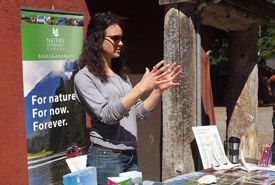
Millie Kuyer (Photo by NCC)
In addition to the above skills, an internship provides you with opportunities to network with others in the conservation sector, including senior staff. With today’s highly competitive job market, networking has become especially important. Sending your application through an online portal can be compared to sending it into a black hole.
“My internship with NCC provided me with opportunities for both personal and professional growth. I have a new, more dynamic perspective on environmental stewardship and conservation, and a better understanding of what it means to work with communities, industry and other partners in ecosystem and land management,” says Millie. “I’m more certain now than ever that I am well-equipped — through education, experience and mentorship — to advance further down this incredible career path.”
NCC offers approximately 50 intern positions across the country every year, with most advertised and filled between January and April. To learn more about NCC’s Conservation Internship program, click here.


